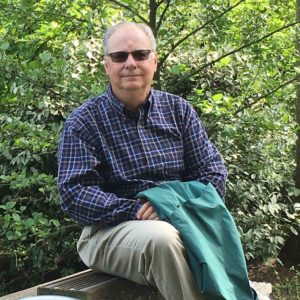262: Bill Sadler on Nutrition to the Soil and Plants.
Developing solutions for our growing mediums.
 Bill began farming at the age of eight, when under the watchful eye of his father, he both successfully managed his own tomato & vegetable stand selling his own harvests, and helped raise Nubian dairy goats on the family farm.
When his family purchased a large farm in rural Missouri, he and his father developed a cattle operation and planted their own vineyard. His father’s pioneering influence and background in agriculture and sustainable farming led Bill to appreciate these methods long before they were considered “cool.”
Bill began farming at the age of eight, when under the watchful eye of his father, he both successfully managed his own tomato & vegetable stand selling his own harvests, and helped raise Nubian dairy goats on the family farm.
When his family purchased a large farm in rural Missouri, he and his father developed a cattle operation and planted their own vineyard. His father’s pioneering influence and background in agriculture and sustainable farming led Bill to appreciate these methods long before they were considered “cool.”
Bill earned his PhD in Biochemistry, and with skills as a proven problem solver, focuses on developing green and sustainable solutions for a wide range of products and services.Don’t miss an episode! Click here to sign up for weekly podcast updates
In This Podcast:
Soil nutrition is not just a simple matter to Dr. Bill Sadler; it is so significant that feeding the life in the soil is central to the whole life cycle. He explains the importance of healthy nutrition for the multiple families of organisms in the soil, as well as why different groups need different foods. He also shares why noticing which weeds are growing can help you understand what is happening in your soil.
Listen in and learn about:
- Growing up in a family that adored nature
- The changes in soil from the constant years of agriculture mining practices
- How his science background helped him understand how things were connected
- Comparative nutrition in the study of biology
- Why comparative is important in the study of soil
- The difference between soil and dirt, and the purpose of soil
Producer’s note: Here is a link to Podcast 158: Elaine Ingham on Life in the Soil
- The organism and species in soil
- Bacteria
- Single Cell Organisms
- Fungus – including mycorrhiza
- Insects
- Worms
- Invertebrates
- Vertebrates
- How plants feed the soil
- The goal of getting a healthy balance
- One important thing to keep soil healthy is to feed it
- Deciding how to feed your own personal soil
- The difference between different amendments
- Wheat middlings, alfalfa, and more
- Classifying options organic, vegan, and non-gmo
- Why rainforest soils are poor, and comparing that to other climate zones
- Small and over time – rather than all at once
- Diversity of nutrients and why that is important
- Why weeds are good – don’t shoot the messenger
- What dandelions mean about your soil, and how to listen to what they are saying
- Garden Maker Naturals – the purpose and method of this soil amendment company
- Why the suggestion to de-thatch a lawn is unnecessary if you have an organic lawn system
As well as:
- His failure – The time he ‘steamed’ his plants by over feeding his soil and killed a bunch of plants
- His success – Being part of a program to build an endangered species zoological diet line
- His drive – The comfort of helping things grow better, and helping others achieve what makes them happy
- His advice – Be patient
Bill’s Book recommendations:
The Fellowship of the Ring: Being the First Part of The Lord of the Rings by J.R.R. Tolkien
The Organic Lawn Care Manual: A Natural, Low-Maintenance System for a Beautiful, Safe Lawn by Paul Tukey
How to reach Bill:
Website: gardenmaker.com
UrbanFarm.org/GardenMaker
*Disclosure:
Some of the links in our podcast show notes and blog posts are affiliate links and if you go through them to make a purchase, we will earn a nominal commission at no cost to you. We offer links to items recommended by our podcast guests and guest writers as a service to our audience and these items are not selected because of the commission we receive from your purchases. We know the decision is yours, and whether you decide to buy something is completely up to you.


